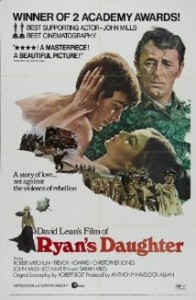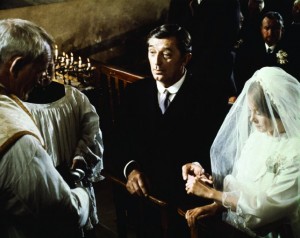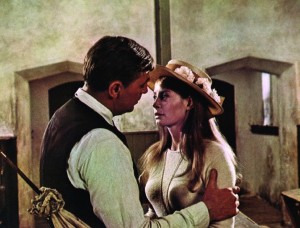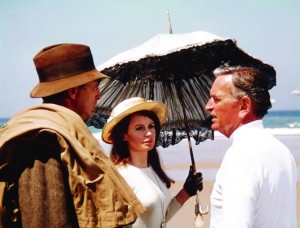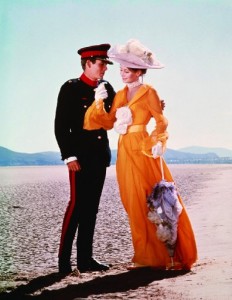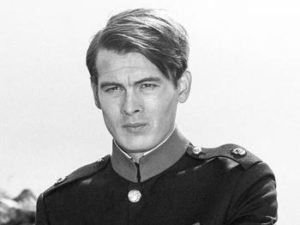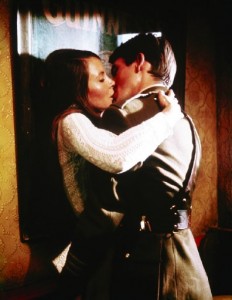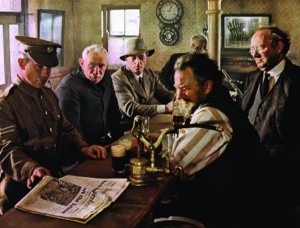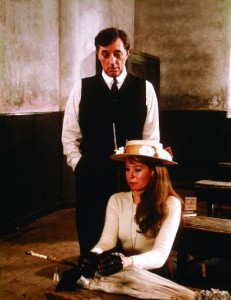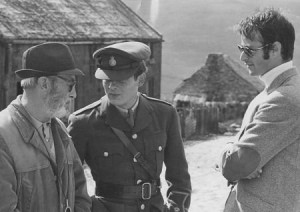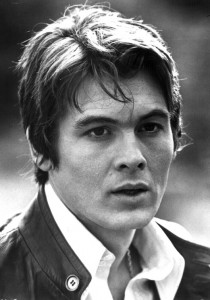Ryan’s Daughter *** (1970, Robert Mitchum, Trevor Howard, John Mills, Sarah Miles, Christopher Jones, Leo McKern) – Classic Movie Review 901
David Lean’s grand epic 1970 romantic period drama Ryan’s Daughter survived a troubled year-long shoot and bad reviews, and was a hit. It won Oscars for Best Supporting Actor (John Mills) and Best Cinematography (Freddie Young).
Director David Lean’s grand and great-looking but slack-paced and limited 260-minute epic 1970 romantic period drama Ryan’s Daughter, set in Ireland in 1916 in the wake of the Easter Rising, is planned to be huge in every way. Sarah Miles stars as a married woman in a small Irish village who has an affair with a troubled British officer (Christopher Jones).
They click at once the day they meet when he is the only customer in her father’s pub and she is tending bar for the first time since her marriage to the village schoolmaster. More trouble comes on a stormy night when Irish revolutionaries expecting a shipment of guns arrive at Ryan’s pub.
Ryan’s Daughter is evidently intended as a classy night out at the cinema, a worthy successor to Lean’s Doctor Zhivago. It is designed for the vast acres of the 70mm screen, and is piled high throughout in ace cinematographer Freddie Young’s glorious panoramic views of Irish beaches, storms and sunsets. Young deservedly won an Oscar for his brilliantly eye-catching cinematography in Super Panavision 70.
But Robert Bolt’s original screenplay story just won’t go big. It is an intimate epic blown up out of all proportion. That is the contradiction and central flaw in the film.
Yet it still entertains considerably thanks to Lean’s determination and imagination, as well as to the impressive efforts of a distinguished cast headed by Miles as the excitable heroine Rosy Ryan, Robert Mitchum as Charles Shaughnessy the teacher she marries, Leo McKern as her father Thomas Ryan, Trevor Howard as the local priest Father Collins and John Mills, who won the 1971 Best Supporting Actor Oscar as the mute village idiot.
Miscast American visiting star Jones is properly handsome and dashing but he seems lost (and none too British) as Randolph Doryan, the shell-shocked British officer who starts an affair with Rosy Ryan (Miles).
Jones and Lean had a difficult relationship, as production of the film took 12 months instead of the expected six when Lean waited for the right composition of clouds or the perfect storm. Afterwards, with Lean dissatisfied with Jones’s British accent and judging his voice too flat, he had Jones’s vocals dubbed by Julian Holloway, ending up giving Jones a bad reputation.
Mitchum and Lean also clashed. Mitchum confided: ‘Working with David Lean is like constructing the Taj Mahal out of toothpicks’, but later he said he felt it was among his best roles and he regretted the negative response to the film. Despite the difficult production, he considered Lean was one of the best directors he worked with.
Jones was engaged to Olivia Hussey and refused to do the forest love scene with Miles, allegedly prompting her to conspire with Mitchum, who had the idea of drugging Jones by sprinkling a substance on his cereal. Mitchum accidentally overdosed Jones, who then was nearly catatonic during the love scene. Not knowing he had been drugged, Jones thought he was having a breakdown and was also involved in a car crash.
Troubled actor Jones quit movies after Ryan’s Daughter but ended up a victim of Sunset Strip drug culture and became reclusive and eccentric. However he did art deco painting and Roman classical sculpting in clay, while enjoying a family life at the beach in California with his children.
He refused a role in Quentin Tarantino’s Pulp Fiction (1994), but did film just once more in Mad Dog Time [Trigger Happy] (1996).
He died of gall bladder cancer on 31 aged 72. He was survived by his seven children.
Lean said: ‘Mitchum can, simply by being there, make almost any other actor look like a hole in the screen.’ And, indeed, Mitchum gives the film’s finest performance, naturalistic and credible. And John Mills emerges well too, as his Oscar suggests.
You could try the cut version, which comes in at a handy, condensed 176 minutes.
Robert Bolt’s screenplay is a re-telling of the plot of Gustave Flaubert’s 1857 novel Madame Bovary. Bolt wanted to make a film of Madame Bovary with Miles starring, but Lean read his script and said he found it uninteresting, though suggested Bolt rework it in another setting.
The score is by Maurice Jarre.
It was shot on the Dingle Peninsula in County Kerry, Ireland in 1969, but because the weather was bad, many of the beach scenes were filmed in South Africa, identifiable by the white sand. The shipwreck as Doryan detonates the explosives is the wreck of the Kakapo, south of Cape Town.
Ryan’s Daughter survived bad reviews and was a box office success, grossing nearly $31 million on a budget of $13.3 million. It was nominated for four Academy Awards and won for Best Supporting Actor and Best Cinematography. Miles did well to be nominated Best Actress. Gordon McCallum and John Bramall were nominated for Best Sound. There were 10 Bafta nominations, and spectacularly no wins.
Mitchum admired the script but was reluctant to take the part of Shaughnessy while undergoing a personal crisis. Pressed by Lean, he said: ‘I was actually planning on committing suicide.’ Bolt then told him: ‘Well, if you just finish working on this wretched little film and then do yourself in, I’d be happy to stand the expenses of your burial.’
Lean saw Christopher Jones in The Looking Glass War (1969) and decided to cast him as Major Doryan without ever meeting him because thought Jones had the Marlon Brando/ James Dean quality he wanted. In fact Major Doryan was written for Brando, who accepted, but was forced to drop out over problems with the production of Queimada [Burn!].
The cast are Robert Mitchum as Charles Shaughnessy, Sarah Miles as Rosy Ryan, Trevor Howard as Father Hugh Collins, John Mills as Michael, Christopher Jones as Major Randolph Doryan, Leo McKern as Tom Ryan, Barry Foster as Tim O’Leary, Gerald Sim as Captain Smith, Evin Crowley as Moureen Cassidy, Marie Kean as Mrs. McCardle, Arthur O’Sullivan as Joe McCardle, Brian O’Higgins as Constable O’Connor, and Barry Jackson as a corporal.
© Derek Winnert 2014 Classic Movie Review 901
Check out more reviews on http://derekwinnert.com

